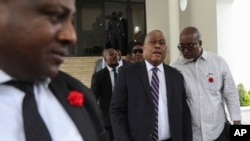Haiti's new prime minister, Garry Conille, left the hospital Sunday in stable condition after being admitted for a respiratory issue one day earlier, two government sources told AFP.
Conille shared a video clip Sunday afternoon, addressing the camera while standing, telling viewers: "I am posting this video to assure you that I am fine."
A government source, speaking anonymously, had told AFP that the prime minister had suffered an asthma attack.
Conille, 58, was appointed to the premiership by Haiti's Presidential Transitional Council on May 29 and was sworn in only last Monday.
The job before him is monumental: to relieve the political, security and humanitarian crises devastating the poorest country in the Western Hemisphere and to pave the way for the first elections since 2016.
"After a week of intense activity," Conille "suffered a slight illness on the afternoon of Saturday, June 8, 2024, and went to hospital for treatment," a statement by the prime minister's press office said Saturday.
A medical doctor by training, Conille served as Haiti's premier for a short period in 2011-2012 and was until recently regional director for the U.N. aid agency UNICEF.
Since his appointment as prime minister, he has been holding a series of meetings with stakeholders and representatives, while working with the Council on forming a cabinet.
In his video Sunday, Conille promised that his cabinet would be completed this week.
Gang violence has long wracked Haiti, but at the end of February armed groups launched coordinated attacks on strategic sites in Port-au-Prince, claiming they wanted to overthrow the unelected and unpopular Prime Minister Ariel Henry.
Henry, who had been running the country since the assassination of President Jovenel Moise in 2021, eventually agreed to resign and hand over power to the nine-member transitional council.
Before his collapse on Saturday, Conille visited the international airport in Haiti's capital Port-au-Prince, praising the efforts of the security forces which had enabled flights to resume after being halted for more than three months due to gang attacks.
The violence has severely affected food security and humanitarian access, with much of the capital in the hands of gangs accused of abuses including murder, rape, looting and kidnappings.
Last year, a U.N.-backed security force to be led by Kenya was promised as a boost to the struggling Haitian police, but its deployment has been repeatedly delayed.
On Sunday the east African country's president, William Ruto, said Kenyan police will deploy probably within weeks.
Kenya is scheduled to send 1,000 officers for the mission alongside personnel from several other countries.




